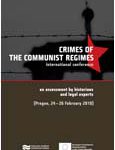The prosecution of communist crimes in Germany
The prosecution of communist crimes in Germany
Author(s): Christoph Schäfgen
Subject(s): Law, Constitution, Jurisprudence, Criminal Law, Human Rights and Humanitarian Law, WW II and following years (1940 - 1949), Post-War period (1950 - 1989), History of Communism
Published by: Ústav pro studium totalitních režimů
Keywords: GDR; German Democratic Republic;
Summary/Abstract: Criminal processing of the injustices committed by the state in the former GDR under the government of the Socialist Unity Party (SED) commenced during the final phase of the GDR era, in the autumn of 1989. Following the reunification of Germany, it continued systematically and without interruption until coming to an end with the last court case in 2005. A timely start and rigorous criminal prosecution was possible because the political will for such an approach was in place and because after reunification Germany had a sufficient number of legal personnel who had not been tainted by the past. Those who called for an amnesty went unheeded. On the contrary, the German parliament passed several bills which pushed the start of a statute of limitations as far back as was legally possible. Staff levels at local state attorney’s offices and courts were beefed up. When deciding about criminal prosecution, the Federal Republic drew on its own experiences of insufficient initial punishment of the crimes of National Socialism, a fact which contributed to social unrest at the end of the 1960s.
- Page Range: 301-304
- Page Count: 4
- Publication Year: 2011
- Language: English
- Content File-PDF

